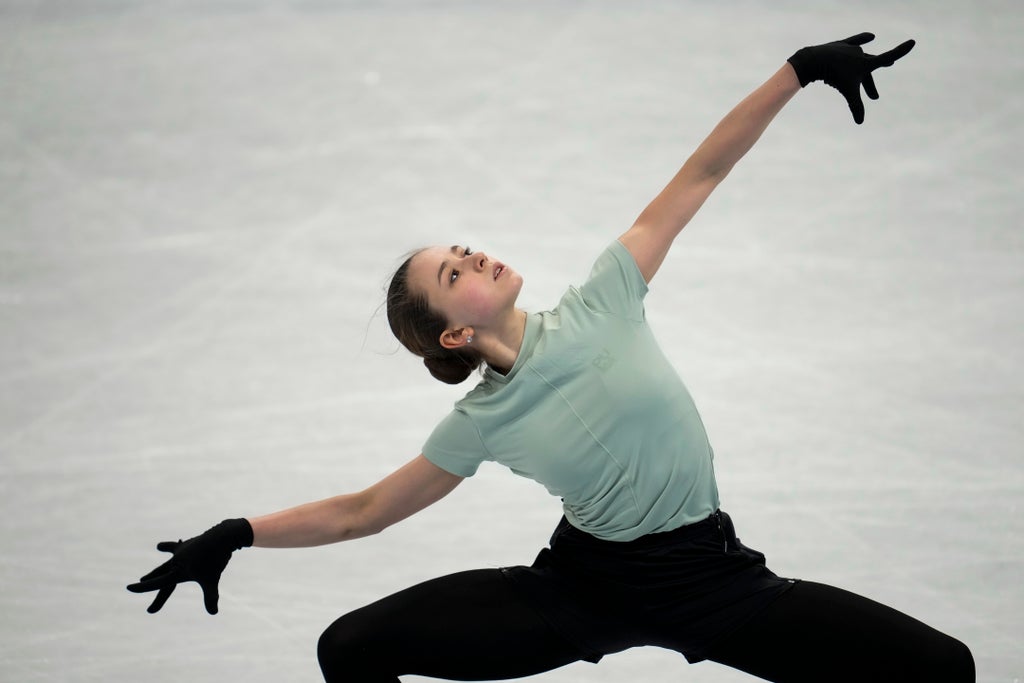
Kamila Valieva aims for the top step of a podium she may never see when the Russian figure skating star, now at the center of the latest Olympic doping scandal, concludes her competition Thursday night with the women's free skate at the Beijing Games.
The International Olympic Committee already has said there will be no flower ceremony if Valieva places among the top three finishers, creating an awkward feeling of open-endedness when the event wraps up. There also will be no medal ceremony for the figure skaters because the IOC fears that Valieva someday could be stripped of hers.
“There will be an asterisk against the results, because they will be preliminary obviously pending the investigation,” IOC spokesman Mark Davis said. "Would we prefer not to have all this going on? Absolutely.”
The 15-year-old Valieva tested positive for a banned heart medication at the Russian championships in December. But the result wasn't announced until last week, shortly after she had helped win a team gold medal that is now also in doubt.
She was cleared to compete earlier this week by the Court of Arbitration for Sport, which ruled among other things that she had protected status as a minor and would suffer “irreparable harm” if she was not allowed to perform. But the court did not rule on the full scope of the case, leaving that to a more comprehensive investigation later.
The court's decision has cast a polarizing shadow over one of the marquee events of the Winter Games.
“Do I feel sorry for her? I don’t think so. I wouldn’t say so,” said Kaori Sakamoto of Japan, who is in third place after her short program. “I’m focusing on the competition. At the moment, I’m actually trying not to think about things like that. Of course, there were moments where I thought: ‘What’s going to happen? What’s happening?’”
Valieva has claimed the drug triggering her positive, trimetazidine, entered her system by accident. But the World Anti-Doping Agency filed a brief stating two other substances she acknowledged taking, L-carnitine and Hypoxen — though both legal — undercut the argument that a banned substance could have been ingested in error.
Hypoxen is used to increase blood flow to the heart, and L-carnitine is an oxygen-boosting performance enhancer that is banned if injected above certain thresholds. When those substances are combined with trimetazidine, U.S. Anti-Doping CEO Travis Tygart said, it's “an indication that something more serious is going on.”
“You use all of that to increase performance,” Tygart said. “It totally undermines the credibility” of Valieva’s defense.
In the meantime, IOC President Thomas Bach offered Olympic torches to the U.S. figure skaters who won team silver medals as a holdover gift while they await the resolution of the doping case, The Associated Press learned late Wednesday.
Officials from the IOC have not responded to requests for comment on Bach’s meeting with the team.
“That’s definitely disappointing,” said Karen Chen, who competed in the team event and enters Thursday night in 13th place after her short program. “I really was looking forward to being on the podium with my teammates, and just sharing that moment, and I’m sure I’m not the only one that felt that way. So definitely, definitely disappointing.”
While the doping case continues to unfold around her, Valieva has tried to go about her business as usual, taking part in every practice session on her schedule. And though she looked calm and collected during a run-through for her short program, the tension appeared to finally get to her when skated off the ice and broke down in tears.
Even though her performance, which included a shaky triple axel, left her in first place by nearly two points.
Valieva refused to speak to reporters after the short program, though she would be required to attend a news conference if she finishes in the top three Thursday night. In her only public comments so far, Valieva told Russian state broadcaster Channel One on Monday night that “these days have been very difficult for me. I’m happy but I’m tired emotionally.”
Valieva plans to go big in her free skate, set to “Bolero” by the early 20th century French composer Maurice Ravel. The leader of the Russian team's “Quad Squad” is attempting three of the four-revolution jumps: a quad salchow on her opening jumping pass, a quad toe loop-triple toe loop combination and a quad toe loop-triple salchow combo.
Valieva's program has the highest base value — by far — of anyone in the field, which means she would have to miss several of the jumps and have an uncharacteristically poor performance to land anywhere but first place.
Her closest pursuer, teammate and world champ Anna Shcherbakova, is planning to open with a quad flip, while Alexandra Trusova has planned an ambitious five quads in her free skate as she tries to leapfrog third-place Sakamoto and give the Russians the first sweep of the women's figure skating event in Olympic history.
“If I skate clean, there is a chance I will get Olympic gold,” Trusova said. “If not, then not. My goal is to skate clean.”
___
AP National Writer Eddie Pells in Zhangjiakou, China, and AP Sports Writers James Ellingworth and Graham Dunbar in Beijing contributed to this report.







